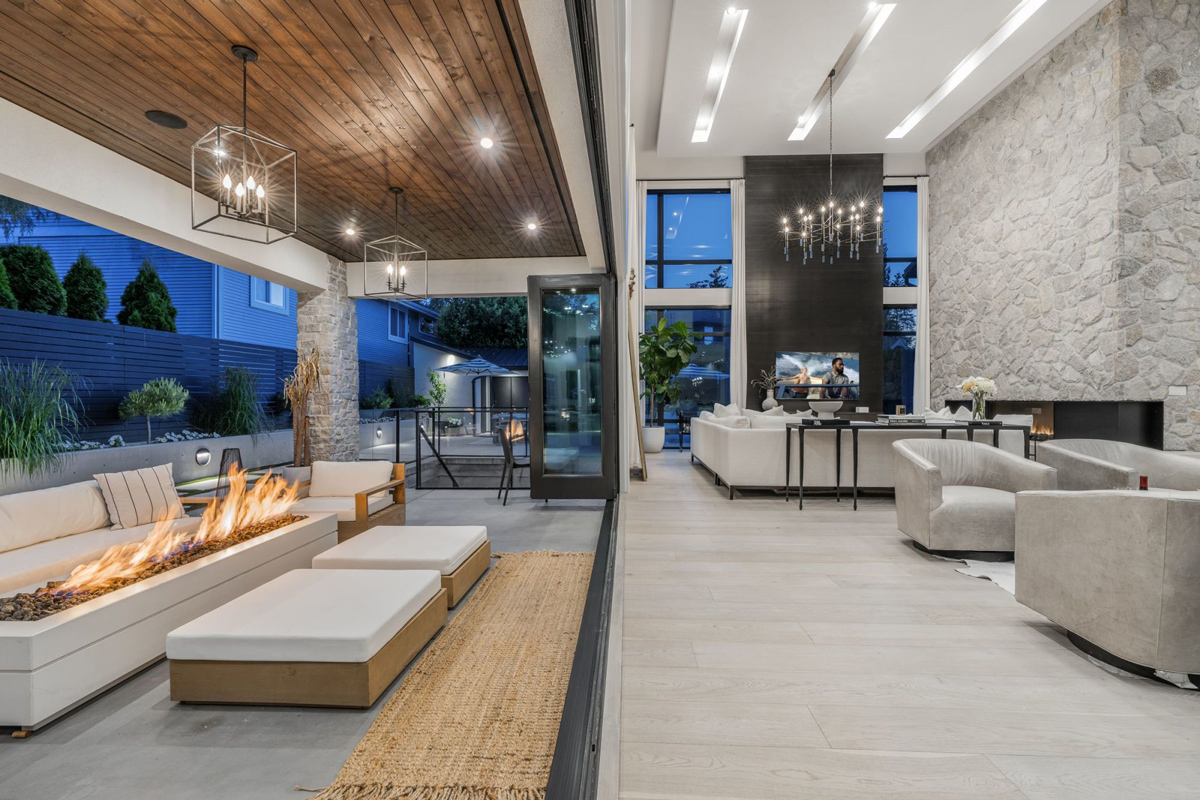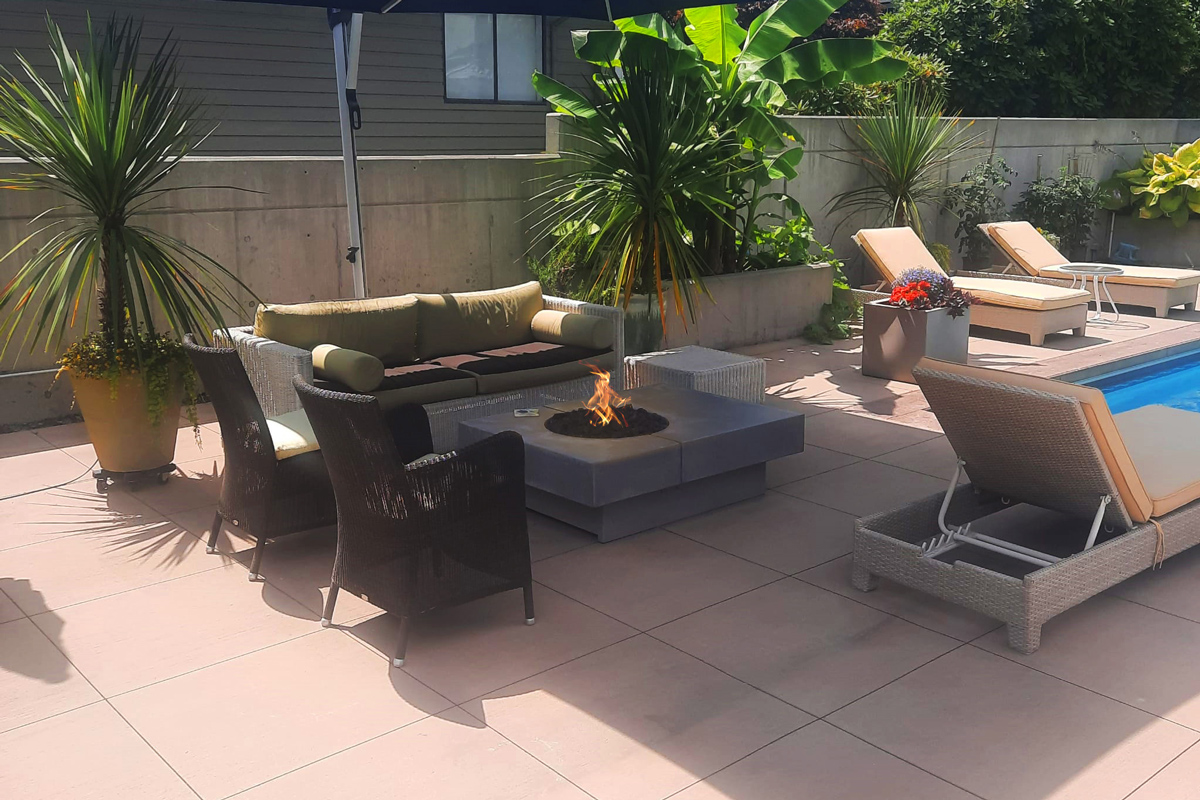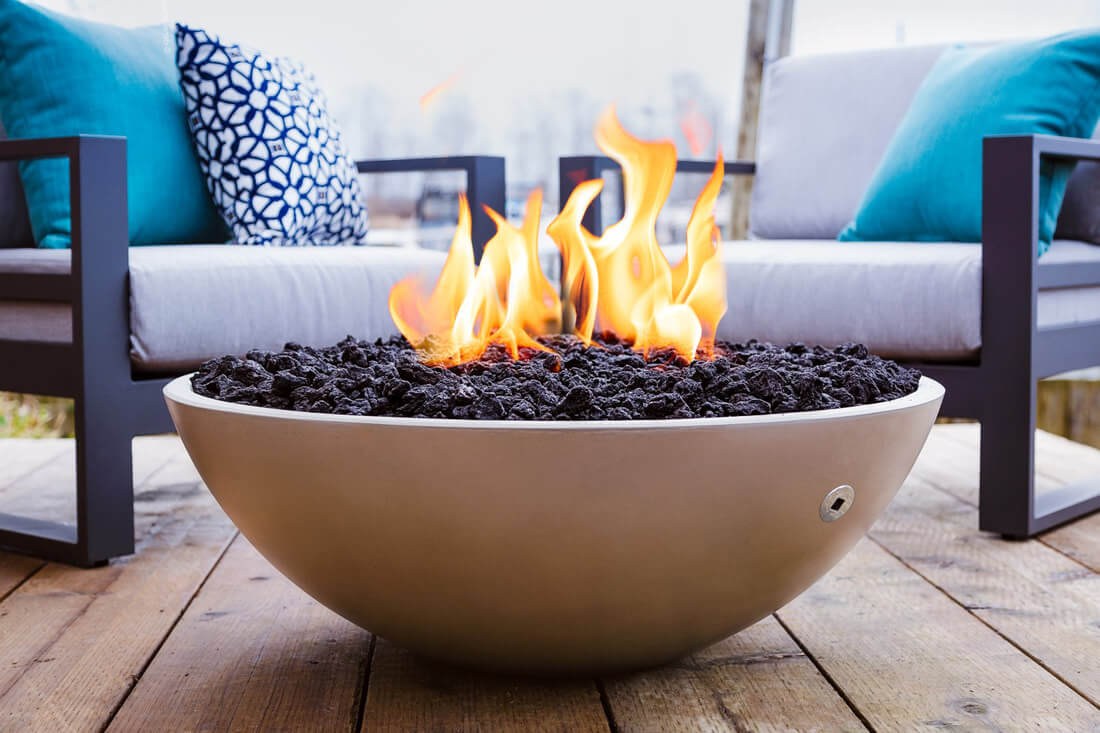Which Fire Pit Fuel Type? Propane vs Natural Gas
Propane vs Natural Gas

We have all been fascinated by fire from the time it was first discovered to this age of memes and technology. Watching the perpetual motion of the flames as it give us warmth and comfort is like being in an oasis of serenity.
Fortunately, DreamCast firepits can bring this experience right into your backyard. Our collection of fire pits from our minimalist Zen Bowl to our 72” Linear fire tables give a campfire feel to your personal outdoor space. These fire pits are designed to accommodate all types of patios, layouts and of course, your style. See our Zen 34 in the Western Living home feature of NHL star Trevor Linden with inspriring photos of the modern home.
Common type of gas fuel types are either Natural Gas or Propane. Ethanol is also an option, but not a topic of this article. Some areas have certain restrictions when it comes to gas connections – to which gas do you have access? That is why it is very important to know in your area the type of gas burner required for your fire pit.
Difference Between Propane and Natural Gas
Natural gas consists of mostly methane. It also contains propane, butane, and a few other gases too. Natural gas comes from underground shale deposits. You may have heard of the controversial method called fracking to release the gas from the underground. So, propane is actually refined natural gas. It burns cleaner and hotter than natural gas, so it is considered a much more efficient gas fuel. Propane is also much more available than natural gas because after it is liquified, it’s easy to store in tanks and transport. For example, propane can be delivered by truck to a remote home that doesn’t have natural gas lines available.
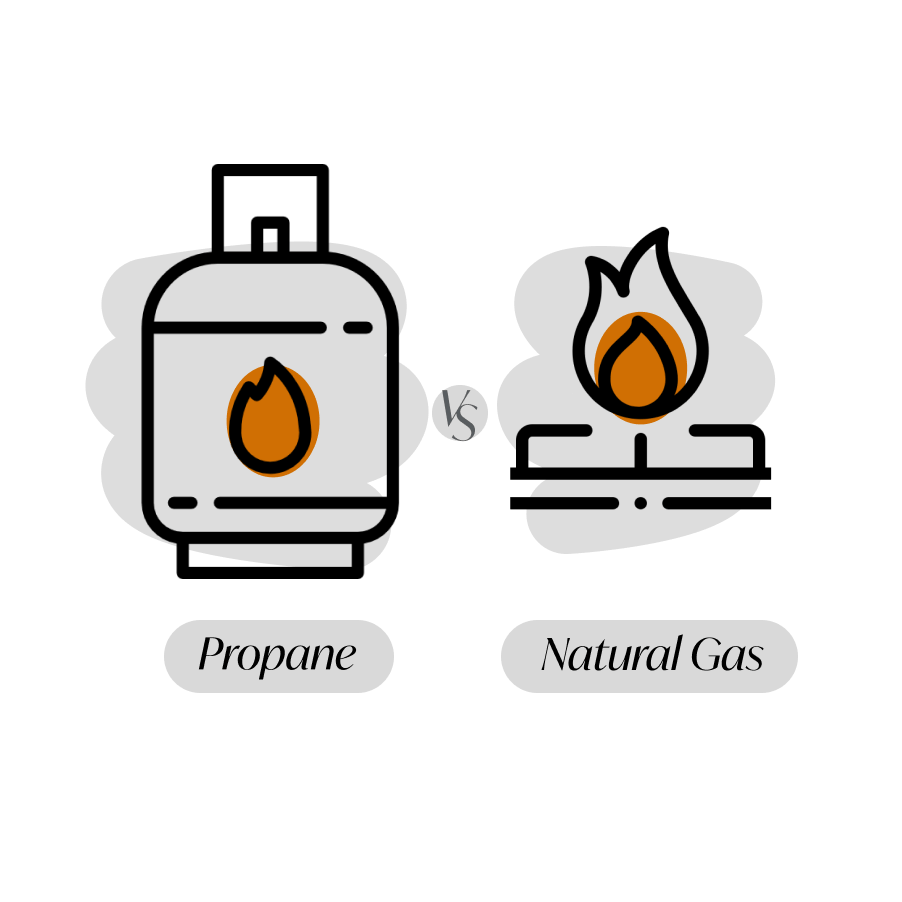
Natural Gas
Natural gas is cheaper than propane, but propane burns hotter, cleaner, and is way more available than natural gas. Propane actually produces twice as much heat as an equal amount of natural gas. For homeowners with natural gas lines available it is cheaper to heat your home with natural gas so in that case, natural gas is the better alternative.
Propane
How long does a propane tank last? You will get about 95 hours per gallon if burned at a rate of 1000 BTU per hour. As an example if you have a heater with a BTU rating of 30,000, then a gallon of propane will last you 3.17 hrs.
How Many Gallons of Propane in a 20 Pound Tank?
A 20-pound propane tank is the most common size tank. A 20 lb tank is the typical size tank for barbecue grills and the ones you can get in the easy refill programs at Home Depot and gas stations. A 20 lb propane tank holds 4.5 gallons of propane.
If you have the privilege to choose between natural gas or propane but are torn between the two, our list of advantages and disadvantages of each gas type may help you feel more comfortable in making that decision.
See the list below.

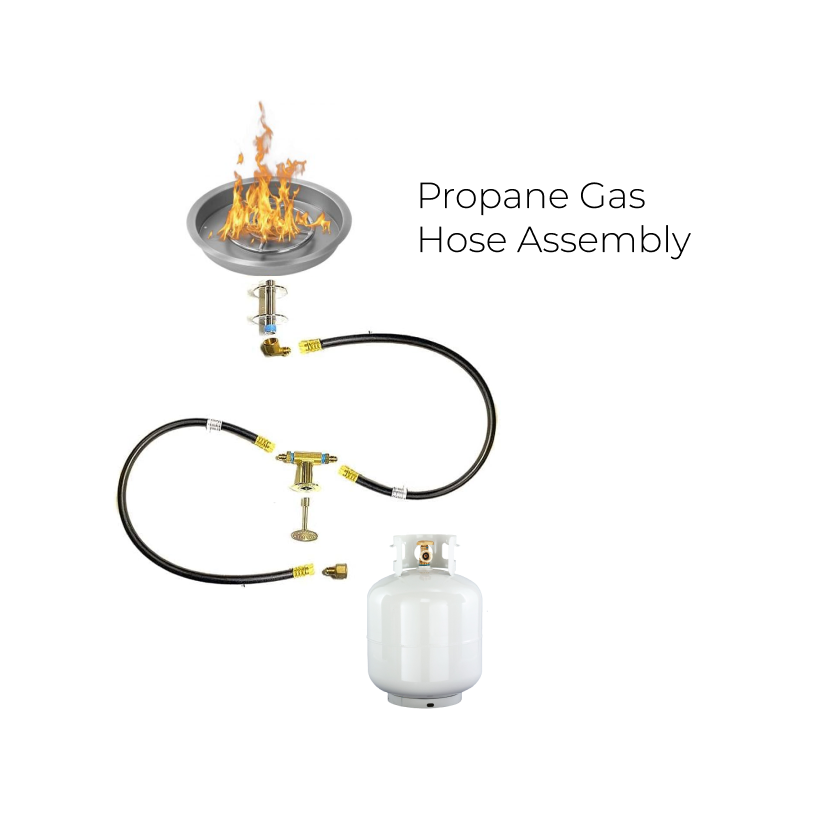
Advantages of Propane
– Setting up is easy
– No need for new landscaping work, if you are not plumbing directly to an onsite tank
– Instant backyard upgrade
– Emits warmer heat than natural gas
– Easy refill (bottle switch programs)
– Mobile – you can change up your patio layout
Disadvantages
– The connection hose is visible
– Emits warmer heat, but it comes in lower BTU options so you can get more fuel time out of a standard 20lb propane tank.
– Higher BTU fire pits need bigger onsite tank
– Propane tank is visible (a side table or tank cover may be needed to hide it)
– Need to refill tanks
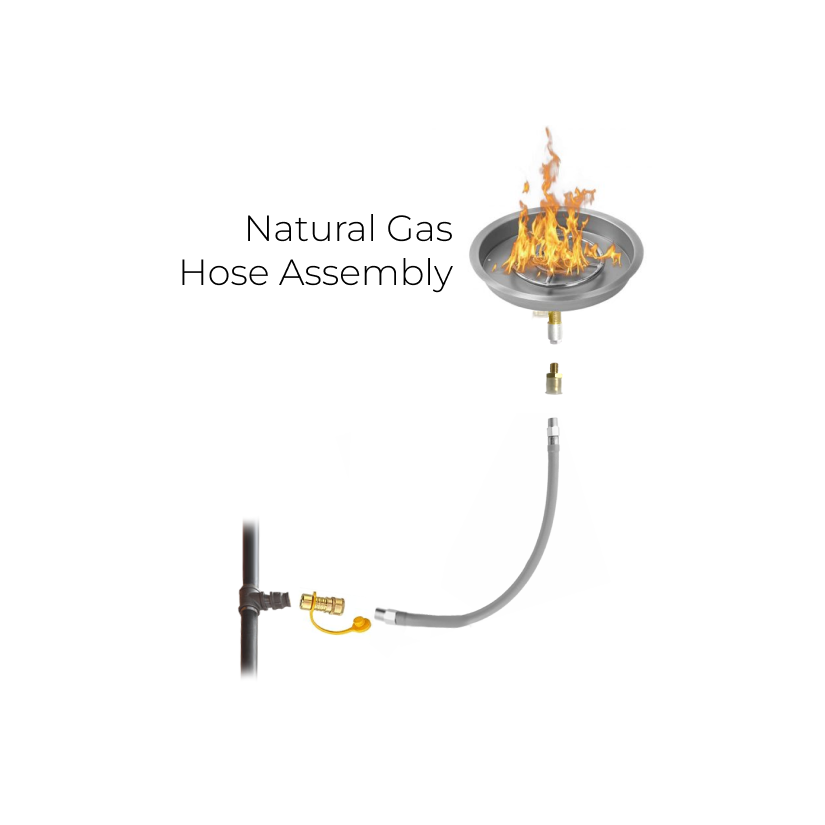
Natural Gas Advantages
– Less expensive than propane (depending on where you live)
– No need to refill fuel
– Can be hard plumbed- meaning no hose! (unless it’s a quick connect)
– Provided there is enough pressure in the house, you can go CRAZY with the BTUs on the firepits
Disadvantages
– A maximum of 20′ hose is required for a quick connect option
– It can be expensive to run a line and/ or add a quick connect box
– Once hard plumbed, the unit cannot easily be relocated
– Outdoor lay out cannot be reorganized once plumbed in the ground
Whatever type of gas you decide to use for your firepit, you will need a certified gas fitter to install it.
Fire is fire, let’s enjoy it with care. You can read this article in the Vancouver Sun for more tips on backyard design with fire pits.
Schedule a Complimentary Consultation

Get In Touch
If you have any questions about fire pits, need a quote for a custom project, or just want some help planning your firepit layout, give us a call today.
If you’re not ready to make any decisions right now, why not take a look at our product gallery for more inspiration, or follow us on Instagram to keep up with the latest trends and promotions.
Thanks for reading! We hope this has been helpful.
Author
Catherine Traschenko
Fire Products Design Specialist
As a partner at DreamCast, she has been immersed in the decorative concrete industry since 2007, specializing in fire pits & mantels. With a passion for interior design her expertise drives innovative design and exceptional craftsmanship.
